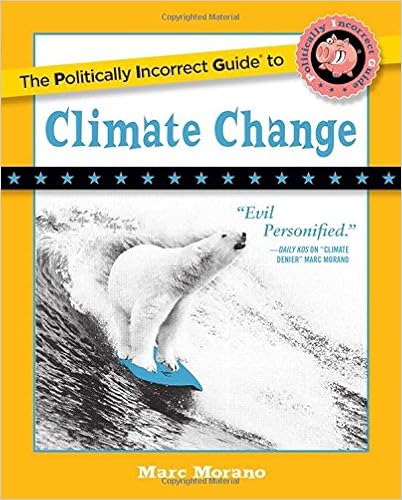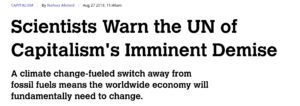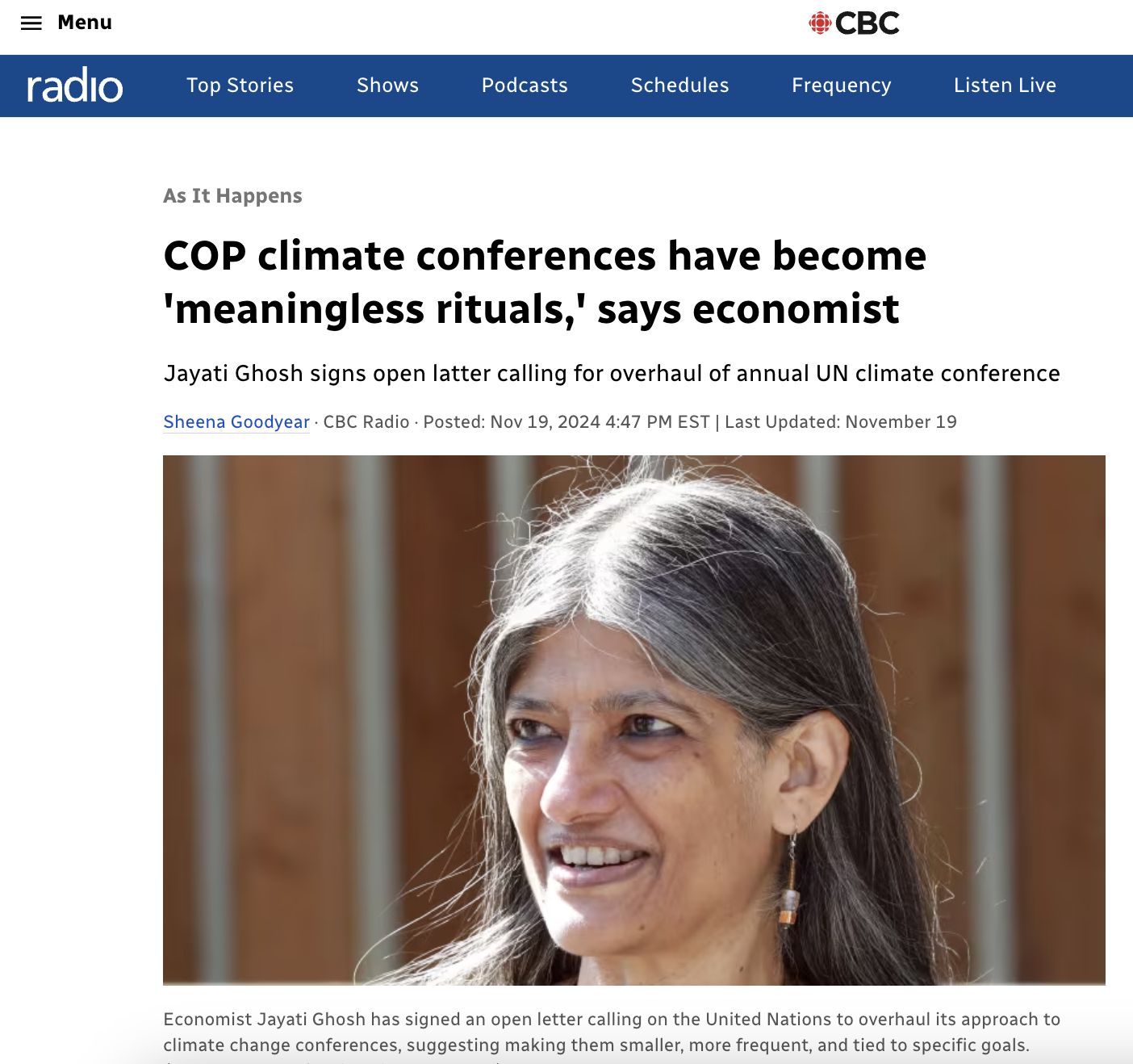Scientists Warn the UN of Capitalism’s Imminent Demise
A climate change-fueled switch away from fossil fuels means the worldwide economy will fundamentally need to change.By Nafeez Ahmed
Capitalism as we know it is over. So suggests a new report commissioned by a group of scientists appointed by the UN Secretary-General. The main reason? We’re transitioning rapidly to a radically different global economy, due to our increasingly unsustainable exploitation of the planet’s environmental resources.
Climate change and species extinctions are accelerating even as societies are experiencing rising inequality, unemployment, slow economic growth, rising debt levels, and impotent governments. Contrary to the way policymakers usually think about these problems, the new report says that these are not really separate crises at all.
Rather, these crises are part of the same fundamental transition to a new era characterized by inefficient fossil fuel production and the escalating costs of climate change. Conventional capitalist economic thinking can no longer explain, predict, or solve the workings of the global economy in this new age, the paper says.
Energy shift
Those are the stark implications of a new scientific background paper prepared by a team of Finnish biophysicists. The team from the BIOS Research Unit in Finland were asked to provide research that would feed into the drafting of the UN Global Sustainable Development Report (GSDR), which will be released in 2019.
For the “first time in human history,” the paper says, capitalist economies are “shifting to energy sources that are less energy efficient.” This applies to all forms of energy. Producing usable energy (“exergy”) to keep powering “both basic and non-basic human activities” in industrial civilisation “will require more, not less, effort.”
…
“Sink costs are also rising; economies have used up the capacity of planetary ecosystems to handle the waste generated by energy and material use. Climate change is the most pronounced sink cost,” the paper states.
The paper’s lead author, Dr. Paavo Järvensivu, is a “biophysical economist”—an emerging type of economist exploring the role of energy and materials in fuelling economic activity.
The BIOS paper suggests that much of the political and economic volatility we have seen in recent years has a root cause in ecological crisis.
…
Hall and Klitgaard are highly critical of mainstream capitalist economic theory, which they say has become divorced from some of the most fundamental principles of science. They refer to the concept of ‘Energy Return on Investment’ (EROI) as a key indicator of the shift into a new age of difficult energy. EROI is a simple ratio that measures how much energy we use to extract more energy.
“For the last century, all we had to do was to pump more and more oil out of the ground,” say Hall and Klitgaard. Decades ago, fossil fuels had very high EROI values—a little bit of energy allowed us to extract large amounts of oil, gas and coal.
…
In short, according to Grantham, “we face a form of capitalism that has hardened its focus to short-term profit maximization with little or no apparent interest in social good.”
…Toward a new economic operating system
Most observers, then, have no idea of the biophysical realities pointed out in the background paper commissioned by the UN Secretary-General’s IGS—that the driving force of the transition to postcapitalism is the decline of what made ‘endless growth capitalism’ possible in the first place: abundant, cheap energy.
End Excerpt (Via WattsUpWithThat.com – The new report is available here)
#
Editor’s Note: The following is an excerpt from author Marc Morano’s new 2018 best-selling book, The Politically Incorrect Guide to Climate Change.

(Move over Rachel Carson! – Morano’s Politically Incorrect Climate Book outselling ‘Silent Spring’ at Earth Day – Order Your Book Copy Now! ‘The Politically Incorrect Guide to Climate Change’ By Marc Morano)
Book Excerpt
Controlling Climate…or You?
Global warming is not about the science. There’s very little scientific evidence to back up the threats of catastrophic and man-made climate change, and copious data refutes the fears. So what is it really about? Is there a larger agenda at play? (Hint: Of course there is.) MIT climate scientist Richard Lindzen has laid out the real agenda behind the global warming scare. “Controlling carbon is a bureaucrat’s dream. If you control carbon, you control life,” Lindzen said in 2007.
The climate change panic is all about central planning, global governance, planned recessions, and redistributing wealth. It’s just the most recent in a long chain of eco-scares—overpopulation, deforestation, the ozone hole, resource scarcity, and so forth—for which the solution is always the same: global regulation by central planners. At the moment, the UN IPCC is the leader of this agenda. The UN “experts” openly say they want to redistribute wealth by climate policy. They are using the science as tool in a partisan political campaign effort for centralized government planning through the United Nations and the European Union.
“Eyes Bulge” at Climate Taxation
“Global warming, climate change, all these things are just a dream come true for politicians. The opportunities for taxation, for policies, for control, for crony capitalism are just immense, you can see their eyes bulge.”—MIT professor emeritus Richard Lindzen
Former EU Climate Commissioner Connie Hedegaard gave the game away when she said that global warming policy is right even if science is wrong. In 2013 the Telegraph reported her as saying that “regardless of whether or not scientists are
wrong on global warming, the European Union is pursuing the correct energy policies even if they lead to higher prices.” Hedegaard asked, “Let’s say that science, some decades from now, said ‘we were wrong, it was not about climate,’
would it not in any case have been good to do many of things you have to do in order to combat climate change?…I think we have to realize that in the world of the 21st century for us to have the cheapest possible energy is not the answer.”
Hedegaard was echoing former Obama White House science czar John Holdren, who had claimed in an essay in the Windsor Star, “The U.S. is threatened far more by the hazards of too much energy, too soon, than by the hazards of too little energy, too late.”
Holdren had also warned that the United States already had too much energy—in 1975. “Mounting evidence suggests that the United States is approaching (if not beyond) the level where further energy growth costs more than it is worth.”
Former Democratic U.S. Senator Timothy Wirth said something similar—but even more revealing—in the 1990s: “We’ve got to ride the global warming issue. Even if the theory of global warming is wrong, we will be doing the right thing, in terms of economic policy and environmental policy.”
So, according to the admissions of its own leadership, the point of the campaign against global warming is not really the supposed climate science. No, the real agenda is the “solutions” to the alleged crisis. Those “solutions,” which the members of the global governance lobby want in any case for other reasons, are what is driving the movement.
Spreading the Wealth, Governing the Globe
In November 2010 a top UN IPCC official revealed the real agenda. “One must say clearly that we redistribute de facto the world’s wealth by climate policy. Obviously, the owners of coal and oil will not be enthusiastic about this,” said Ottmar Edenhofer, who was co-chair of the IPCC’s Working Group III and a lead author of the IPCC’s Fourth Assessment Report, released in 2007. Edenhofer’s candid revelations about the motivations for climate change policy were eye-opening. “One has to free oneself from the illusion that international climate policy is environmental policy. This has almost nothing to do with environmental policy anymore, with problems such as deforestation or the ozone hole.”
At the Bali UN climate summit in 2007, climate activists advocated the transfer of money from rich to poor nations, purportedly in order to fight global warming. “A climate change response must have at its heart a redistribution of wealth and resources,” said Emma Brindal, a climate justice campaigner coordinator for Friends of the Earth.
If, as Lindzen says, controlling carbon dioxide is a bureaucrat’s dream, then the global warming advocates are in a field of dreams as they envision centrally planned energy economics and regulations over ever-increasing aspects of our lives.
Former Vice President Al Gore even declared in July 2009 that the congressional climate bill that passed the House would help bring about “global governance.” Gore explained, “one of the ways it will drive the change is through global governance and global agreements.”
UN Secretary-General Ban Ki-moon trumpeted that same concept in a 2009, New York Times op-ed. “A [climate] deal must include an equitable global governance structure,” he wrote. Also in 2009, it was announced that the Obama State Department wanted to form a global “Ecological Board of Directors.” In 2000, then French President Jacques Chirac had said the UN’s Kyoto Protocol on global warming represented “the first component of an authentic global governance.”
The much-touted “carbon tax” is another step toward both wealth distribution and a central global governance structure dictating every aspect of our lives from our light bulbs to transportation to home energy to our diets. In December 2007, the UN climate conference in Bali urged the adoption of a global tax on CO2 emissions that would represent “a global burden sharing system, fair, with solidarity and legally binding to all nations.”
Two years later, a top German climate advisor proposed the creation of a CO2 budget for every person on planet.” Hans Joachim Schellnhuber told Der Spiegel that this internationally monitored “budget” would apply to “every person on the planet, regardless whether they live in Berlin or Beijing.”
According to Schellnhuber, the “industrialized nations have already exceeded their quotas if you take into account past emissions.” Describing a form of climate reparations, he explained, “The West would give back part of the wealth it has taken from the South in the past centuries and be indebted to countries that are now amongst the poorest in the world.”
End Book excerpt
#



